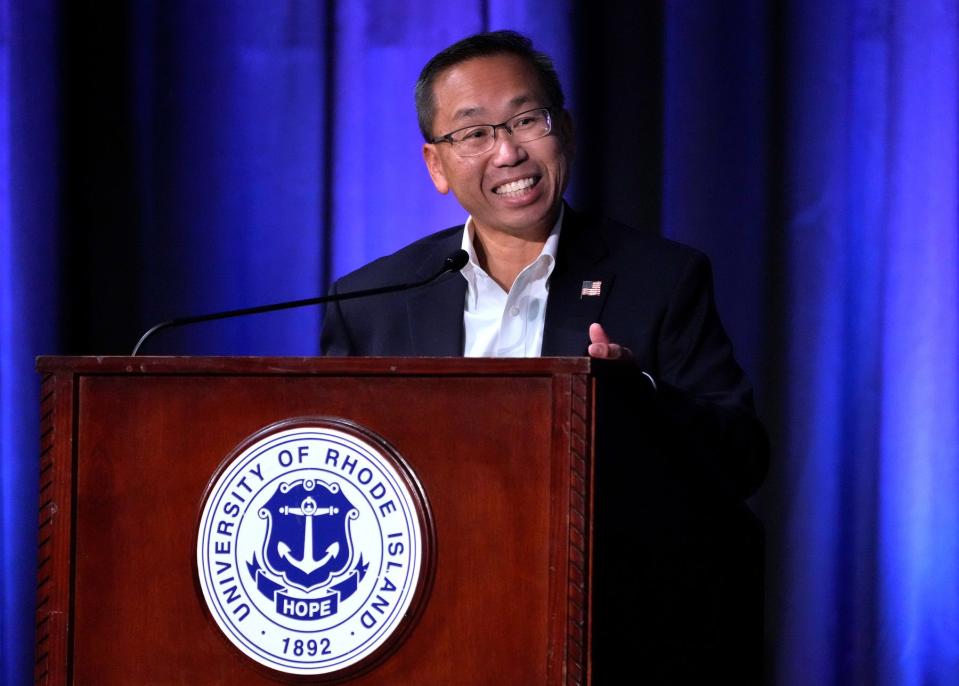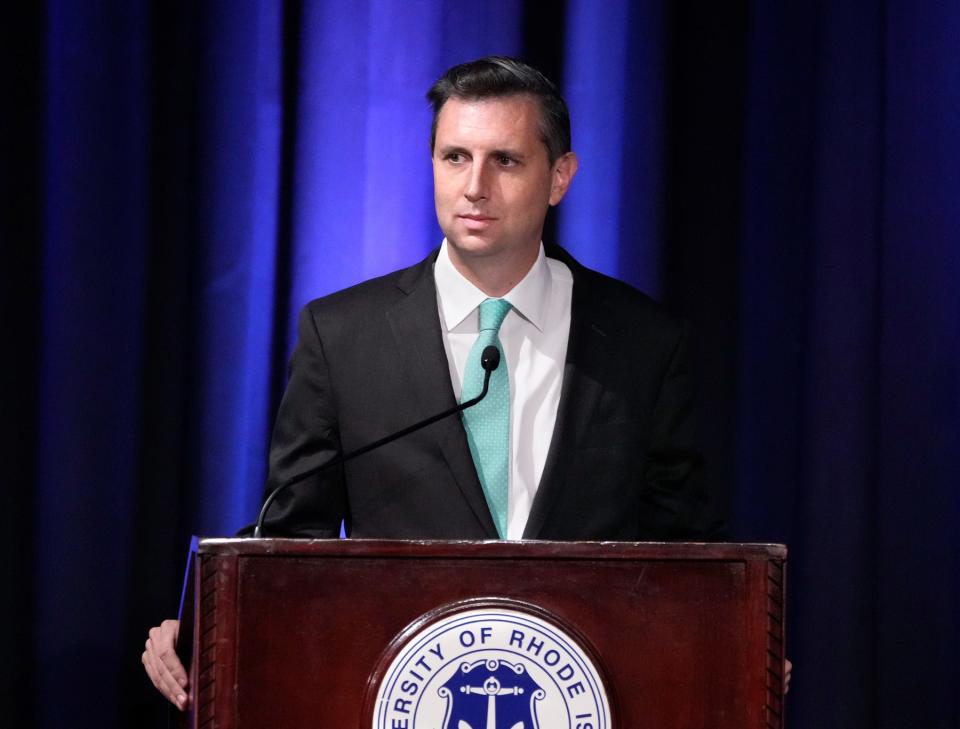What would Rhode Island congressional candidates try to do about inflation?
- Oops!Something went wrong.Please try again later.
- Oops!Something went wrong.Please try again later.
- Oops!Something went wrong.Please try again later.
Rising prices and the high cost of energy have, rightly or wrongly, dominated debate this election season.
That's partly because Republican candidates across the country have seized on inflation as an issue on which to make next Tuesday's elections a referendum on the party in power.
And partly because the 9% inflation in the United States is higher than at any time in the last four decades.
In Rhode Island's 2nd Congressional District campaign, Republican Allan Fung and Democrat Seth Magaziner both say that, if elected, they will work to reduce the cost of living. And they accuse each other of pushing ideas that would exacerbate the problem.
But trying to describe clearly what each candidate is proposing and how it stacks up with economic and political reality is not as easy as it could be.
Much of the campaign rhetoric has focused on what caused prices to rise in the first place, with Fung blaming President Joe Biden and Democrats in Congress for it.
Did Democrats cause high inflation?
The Journal asked Jeffrey Colgan, associate professor of Political Science and International Studies at Brown University, how much pandemic stimulus, and particularly Biden's American Rescue Plan, contributed to inflation.
He said economists believe most of the jump in prices comes from other factors, but that federal COVID spending is a piece of it.
"Inflation has ben running roughly 9%, and that’s true not just in U.S., but most of the G7 nations, so to say that it is what happened in Congress ignores what is happening everywhere," he said. "But a small portion of that is attributable to the economic response. The best estimate is 2 points out of 9%."
Economic worriesWill inflation woes convince Rhode Islanders to send a Republican to Congress in CD2?
(Colgan noted that along with the price increases, Rhode Islanders are getting something from the spending, including not only direct payments, but public works that wouldn't otherwise happen – and that unemployment remains at historic lows.)
Liam Malloy, associate professor and chair of the economics department at URI, said as much as 30% of inflation could have been tied to COVID response.
"Disposable income went up in a pandemic-caused recession, which is unheard of," Malloy said. "And because of the pandemic we were buying different things and there were supply constraints and all those things combined led to higher inflation, then the war in Ukraine exacerbated it."
On energy prices, Republicans have blamed Democratic climate policy and hostility to fossil-fuel extraction for raising gasoline prices and utility rates.
State regulators approve new gas rates,try to soften impact with bill credits
Both Colgan and Malloy were skeptical that Democratic energy policy had a large direct impact on the price of energy.
The Keystone XL pipeline, which Biden blocked, wouldn't have been built yet even if approved, they said. And the reluctance of oil and gas companies to invest in new drilling is largely because they lost lots of money when prices were low.
"The U.S. has become the largest oil producer in world, a fairly big change over 15 years, and that came about through fracking, for which until recently the financial picture was bad," Malloy said. "It is not like we have seen a decrease in oil and gas production. But it is a private company decision not to produce more."
What would Fung do about gas prices?
Considering the outsize role of energy prices in his campaign, Fung's Energy Plan released last month is a little thin on specific proposals.
"We need to tap domestic fuel sources to become energy independent again, while at the same time investing in renewables," the plan says.
Asked in a recent debate what federal policy would accomplish this, he listed tapping "existing infrastructure, like drilled but uncompleted wells."
His campaign has not responded to requests for backup information on what impact these wells would have on oil prices or even whether the federal government can control them.

According to an Oct. 26 U.S. Energy Information Administration report, the 4,333 drilled but uncompleted wells as of September were "the fewest since at least December 2013, when we started estimating the number of DUCs."
Neither Colgan nor Malloy saw drilled but uncompleted wells as a major policy lever for oil production.
"This is really marginal," Colgan said, and may have only a "tiny" impact on the economy, if any.
Fung's energy plan also wants the country to "Say NO to Energy from Iranian and Venezuelan Dictators," although the United States has not imported oil from Iran since the early 1990s and Venezuela since 2019, according to the EIA. (Theoretically, greater U.S. production could reduce Iranian and Venezuelan exports to other countries, but it is not clear if that is what Fung was referring to.)
Congressional District 2: Fung, Magaziner, Gilbert reveal where they stand on key issues
The rest of his plan focuses on investments "in smart and properly sited renewable energy here in America."
A separate issue page on Fung's website attacks Biden and House Speaker Nancy Pelosi for shutting down pipelines and halting permitting for natural gas drilling.
When he took office, Biden did stop the Keystone XL pipeline and suspended drilling leases on some federal land.
But it is unclear whether there was demand for new drilling in places like Alaska anyway, especially in 2020 and 2021.
And the Inflation Reduction Act signed by Biden this year, which Fung and Republicans opposed, requires federal agencies to open up leases in both Alaska and the Gulf of Mexico. Fung said he opposed it because it included tax increases and funding for the Internal Revenue Service.
Republicans also opposed an ultimately doomed proposal from Senate Majority Leader Charles Schumer and West Virginia Sen. Joe Manchin – developed as a side deal from the Inflation Reduction Act – that would have green-lighted a pipeline in West Virginia and made energy permitting easier.
Neither Fung nor Magaziner have said where they stood on the Manchin proposal.
General inflation
Outside of energy policy, Fung says "Washington has a serious spending problem, and it is making everything cost more for families."
As examples, he singled out a $200-million Pelosi earmark for parks at The Presidio in San Francisco, but hasn't identified any future or ongoing spending he would like to cut.
Like new spending, tax cuts can contribute to inflation, but Fung has said he is open to cutting taxes.
What would Magaziner do on energy?
The centerpiece of Magaziner's energy policy is a windfall-profits tax on big oil companies, an idea championed earlier this year by Sen. Sheldon Whitehouse, D-R.I. He said he also supported a suspension in the federal gas tax and would "expand domestic energy production."

Magaziner has largely sidestepped questions about whether the federal government should open up new land, such as the Arctic National Wildlife Reserve, to drilling.
But his campaign on Wednesday noted that he supported the Inflation Reduction Act, which opens up new leases in the Gulf of Mexio and Alaska.
He has declined to say whether he thinks it was a mistake to block the Keystone XL or whether any other pipelines should be built to increase gas-transmission capacity.
Visit from the First Lady:Jill Biden stumps for Magaziner, McKee to get out the vote in the homestretch
Without taking a position on the fairness or overall merits of a windfall-profits tax, Malloy said it is not likely to reduce inflation or energy costs, especially if it discourages companies from investing in new production.
"If [the companies] feel like every time they make a profit their taxes will go up, they will invest less and produce less," he said. "In the future we need to produce less fossil fuels, but it is a delicate balance to keep energy costs reasonably low for people while trying to transition to cleaner energy."
Looking beyond energy, Magaziner criticized Republicans for opposing efforts to let Medicare negotiate lower prices for prescription drugs.
On taxes, Magaziner campaign spokeswoman Patricia Socarras said "Seth supports repealing the Trump tax cuts but only for corporations and families earning more than $400,000 per year."
This article originally appeared on The Providence Journal: What would RI congressional candidates try to do about inflation?

